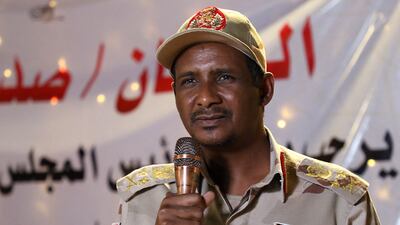The official formation of a rival government by Sudan’s paramilitary Rapid Support Forces (RSF), based on a charter signed in Nairobi in February, has drawn widespread condemnation from key international and regional players.
The formation of the government, declared by RSF leader Gen Mohamed Dagalo on April 15, the second anniversary of the start of its war with the Sudanese army, has been widely criticised for deepening Sudan’s crisis and further fragmenting the country.
Saudi Arabia, thus far one of the war’s key mediators, denounced the RSF’s declaration as illegal, while the African Union reaffirmed its commitment to Sudan’s territorial integrity, warning against destabilising moves, particularly in the western Darfur region, which is controlled by the paramilitary.
Egypt, who Gen Dagalo accused in his speech of supplying arms and equipment to the army, also rejected the RSF’s plans and called for unity and dialogue under legitimate institutions. The UK, which hosted the London Sudan Conference on the day of Gen Dagalo's announcement, said the formation of a parallel government was “not the answer” to the country's crisis.
Gen Dagalo outlined the goals of his “Government of Peace and Unity” in a pre-recorded speech, including decentralised rule that gives each of Sudan's provinces more autonomy under the state’s wider authority. He said that a 15-member presidential council with representation from all provinces would be formed to ensure all the country’s groups are represented.
He also envisions a “professional, non-political” national army that can grant equal rights to all citizens irrespective of ethnicity or religion. The RSF leader also pledged to issue a new currency and identification documents, signalling its intent to establish full administrative control in the territory it holds.
However, these promises of unity and inclusivity came against a backdrop of violence and displacement as the RSF intensified attacks on civilian areas over the past two weeks, including on the Zamzam and Abu Shuk displacement camps in North Darfur.
These attacks, condemned by Egypt, the UN, and European nations, have killed civilians and humanitarian workers, undermining the RSF’s claims of protecting Sudan’s people. The French Ministry for Europe and Foreign Affairs described the humanitarian consequences as disastrous, and urged the RSF to halt hostilities immediately.
Sudanese army responds
The Sudanese army, led by Gen Abdel Fattah Al Burhan, dismissed its rival's government as illegitimate.
Sudan’s Foreign Minister, Ali Yusuf, said “no civilian government can be formed in Sudan before the RSF is defeated” and that the paramilitary’s government would fail to gain recognition from more than “three or four countries”.
The army's confidence stems from its recent battlefield successes. In March, the army and allied fighters regained control of Khartoum, the capital, after two years, forcing the RSF to retreat westward towards Darfur, its traditional stronghold. In January, it retook Wad Medani, the capital of Al Gezira state south of Khartoum.
These and other victories have shifted the balance of power in the conflict, consolidating the army's control over central Sudan and leaving the RSF increasingly isolated. They have also hardened the army’s stance against mediation to end the war. Analysts say the army is now less inclined to return to peace talks, preferring to press its advantage militarily.
According to analysts, the RSF's increased attacks on civilian areas are a change of tactics and intended to pressure the army to return to negotiations, where the militia can use its international partnerships for leverage.
Mediation challenges
High-level representatives from more than 20 countries and organisations attended the London Sudan Conference, co-chaired by the United Kingdom, the African Union and the EU, to discuss humanitarian aid, bringing about a ceasefire and pathways to a civilian-led government.
However, the conference ended without a resolution, underscoring the deep divisions among international stakeholders.

Ms Nusseibeh told the conference that "the UAE is unequivocal: neither the SAF [army] nor the RSF represents the people of Sudan and neither can bring stability to Sudan. Only a Sudanese-led, civilian-driven process rooted in civilian and independent leadership can deliver meaningful change,” the state news agency Wam reported.
The UAE last week called for accountability by both sides in Sudan’s conflict over breaches of international law, during a hearing at the International Court of Justice in a case brought by the Sudanese army-led government.
The UAE strongly denied accusations that it was supporting the RSF, calling them a “cynical publicity stunt” intended to deflect from the atrocities committed by the army.
“The Sudanese army’s strategy is clear: to try to damage the UAE’s reputation as a leading humanitarian partner and distract from their own atrocities, including blocking aid, denying the occurrence of famine and rejecting peace efforts,” a senior Emirati told The National in a briefing on the case.

